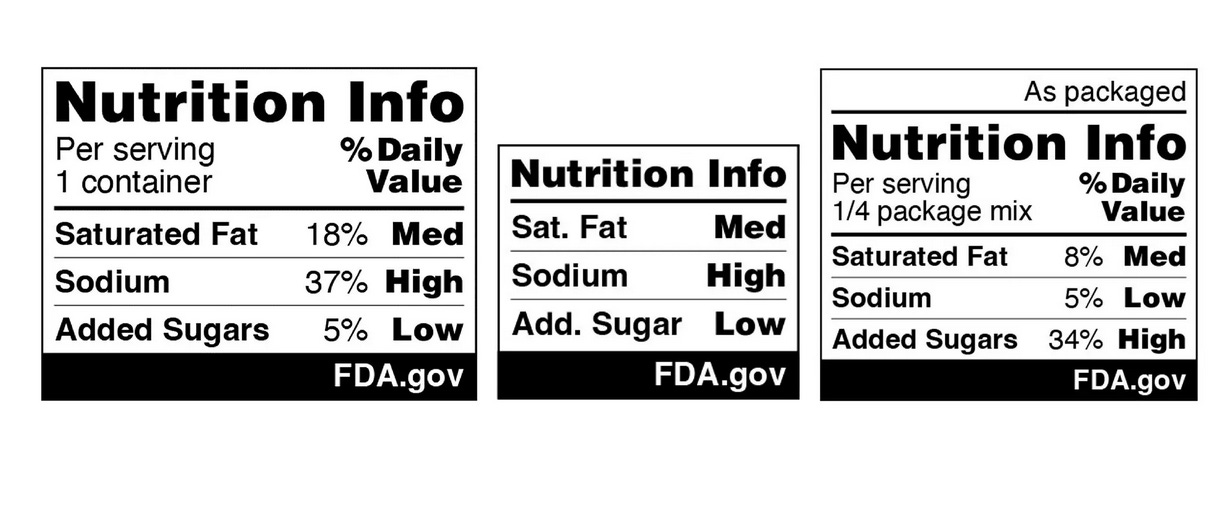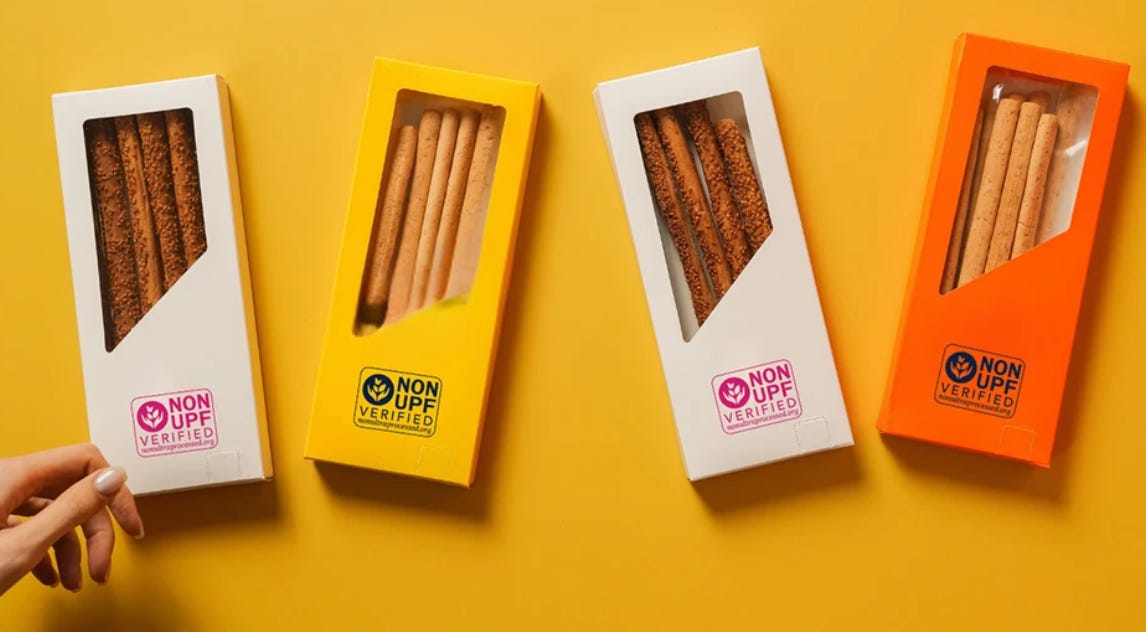New logo for safe snacking?
What I talk about when I talk about labeling foods that aren't ultra-processed, an $8.85-million settlement against ice cream, and new funding for bean-free coffee.
Hello readers. Thank you for joining me here. Welcome also new subscribers to Technically Food, my bi-weekly newsletter about how technology is changing the food we eat. There is so much to read and so much chaos in the world, I appreciate your eyeballs. As always, I welcome your comments and feedback. Email me here or hit the comment button below.
I recorded a podcast yesterday, and a topic that came up was how long it will take for shoppers to adopt new foods. “It’s gonna take time,” I said. “Or new generations –Gen Z or Alpha will get us there.” Not unlike how long it’s taken plant-based milks to become staples in our markets – decades – yet most households still buy both regular dairy and plant-based. My other point was that with ultra-processed food messages flooding our news feeds, most shoppers are now assuming analogues are ultra-processed when compared to the “real” thing. That belief will be hard to dispel.

When we decide what’s healthy, will front-of-pack labeling help us? The FDA is working to finally make this happen, and you can submit comments until May 16th. I’m pretty wobbly that these graphics – usually black hexagons – will stop enough people from buying calorie-dense, nutrient-poor foods. However, in Chile, after the new labels launched, consumers reduced their overall sugar by 9% and caloric intake by 6%. Researchers said the change is “explained by consumers buying healthier products and firms reformulating their products.”

Another option is coming soon from the Non-GMO Project, which currently labels foods free from GMOs. The Non-GMO Project started back in 2010. To date the group says its butterfly logo is found on over 63,000 products from over 5,000 food brands. Because more than 60% of our food is considered UPF, the Non-GMO Project is launching its own symbol called Non-UPF Verified. The clarifying graphic will launch in a pilot phase this spring. The group certainly has the cred to pull this off, but do we need it; and will it help? One industry insider that I spoke to said she applauded them “for capitalizing on the opportunity to make more $ off brands,” but… “I mean how stupid do we seem as consumers?”
Help me gauge what eaters want. Please vote on my super-quick poll below and share what you think we need in a new food label.
I’m just here for the tidbits:
Do you read the ingredients on your ice cream? An $8.85-million settlement was reached against Breyer’s ice cream in a class-action lawsuit from buyers who expected real vanilla bean instead of vanilla flavoring. (Wrong.) If you bought this ice cream anytime between 2016 and 2024 you can file for your award. All you need is a proof of purchase and you’ll get $1 per pint! (One dollar. LOLOL)
Where’s the beef? Mosa Meat filed for EU regulatory approval making it the first startup to do so in Europe for beef...fat!! In Europe, novel foods need to be approved as individual ingredients – versus something like whole cultured chicken that Eat Just and Upside Foods are both approved to sell in the US (but are not). The Dutch company applied to have its cultivated beef fat approved first because of “its transformative culinary properties, even in small quantities,” says the company. The regulatory process is expected to take around 18 months.
Funding news: My food industry insiders say it’s impossible to raise money right now, but a few sparkles exist: Atomo, Seattle maker of bean-free coffee, raised a $7.8m Series-B, bringing it to $59m total investment. Atomo makes a blended product of bean-less and traditional coffee that you can try at all Bluestone Lane locations. Project Eaden, a German company making a spun-protein, plant-based “ham,” raised $15.6m – bringing the startup to $28.1m – to launch its product at 2,000 Rewe supermarket locations in Germany.
A longer read: People want vegan sushi in Japan? Yes, and it’s still a small number. This site reports vegans are 2.9% and vegetarians 9% of Japan’s total population of 124.5 million. But this story reports the market for plant-based foods tripled between 2015 and 2020, and the Ministry of Agriculture, Forestry, and Fisheries expects it to double again by 2030. Plant-based is easier to find in big cities like Tokyo, especially after the 2020 Olympics. A few examples: salmon roe is made from seaweed, eggs are legumes (maybe) and ramen is made with soymilk. [The Grist]
Quirky study of the week: Researchers dug into whether the aroma of green tea makes you sleeeeepy. It definitely doesn’t do that for me but I could be doing it all wrong. Read on. The study, titled “Sedative effects of roasted green tea aroma on autonomic nervous activity, central nervous activity, and subjective mood state in healthy adults,” examined the effects of roasted green tea extract and its major aromatic components on 20 healthy adults who were not adverse to the aroma of green tea. In a psychological evaluation after inhalation, subjects reported reduced scores for “tension”, and “anxiety” and increased those for “mood” and “comfort.” Levels were compared to hot water. Researchers believe the reduction is linked to three different pyrazines found in green tea. If you’re having trouble sleeping brew up some green tea and don’t drink it, inhale it.
Where you can find me:
I’m appearing on two new podcast episodes – Food Truths and Progressive Hedonist – coming soon!
Need an Amazon replacement? Bookshop.org sells books and now ebooks, with proceeds going to independent bookstores. My book is on backorder and if you order it from them maybe they’ll fix that?
Do you dig upcycling? Here’s an event in February that will highlight upcycled ingredients.
Mista is hosting a day-long symposium on healthy eating on March 12th.
Nectar Tasty Awards are on March 12th, too! I will be cloning myself and going to both! (Yes, that means I will be bio-engineered!)



I liked Peru’s simple “high in x” labels
I absolutely read ice cream ingredients! Whoa, the amount of chemicals in some is laughable. Can't wrap my head around why someone wouldn't want to know everything they can about what is in the food they are eating! Yikes, I'm getting so picky I want to know where the hell my organic eggs come from! lol